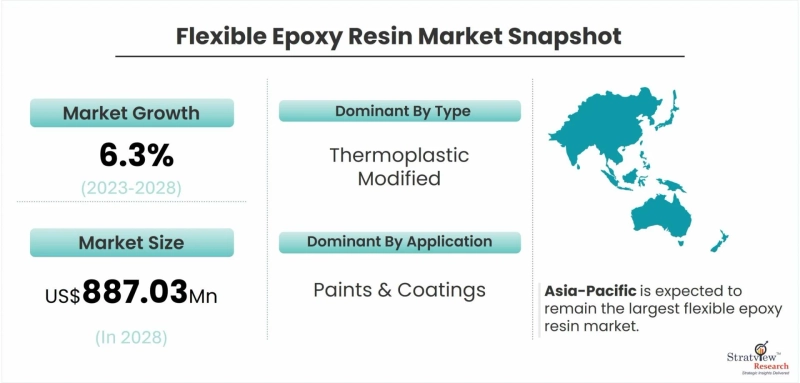According to Stratview Research, the flexible epoxy resin market was estimated at USD 613.08 million in 2022 and is likely to grow at a CAGR of 6.3% during 2023-2028 to reach USD 887.03 million in 2028.
In the realm of polymer technology, where rigidity has long been the norm, the emergence of Flexible Epoxy Resin signifies a transformative shift. This innovative variant challenges traditional expectations by offering a unique combination of strength and flexibility. In this article, we delve into the trends and innovations shaping the Flexible Epoxy Resin landscape, exploring how this dynamic material is bending the norm across various industries.
The Rise of Flexibility: Flexible Epoxy Resin represents a departure from conventional epoxy formulations. While traditional epoxy resins are known for their structural strength and bonding capabilities, the demand for materials that can adapt to dynamic conditions has propelled the rise of flexible alternatives. The market has responded with formulations that retain the fundamental adhesive properties of epoxy while introducing a new level of flexibility.
Diverse Applications in Construction: One notable trend is the increased adoption of flexible epoxy resin in the construction industry. These resins are redefining coatings by providing protective layers that can flex with structural movements. This adaptability is particularly valuable in construction environments where shifts and vibrations are common, as flexible epoxy coatings help prevent the formation of cracks and enhance the longevity of structures.
Automotive Advancements: In the automotive sector, flexibility is now a sought-after characteristic in materials. Flexible epoxy resins find applications in body panel adhesives and coatings, contributing to the industry's pursuit of lightweight yet resilient solutions. The ability of these resins to withstand impacts and vibrations makes them ideal for enhancing the durability of vehicles.
Electronics and the Era of Flex Circuitry: The electronics industry is undergoing a paradigm shift with the introduction of flexible epoxy resins. As consumer demands for smaller, lighter, and more flexible electronic devices grow, the incorporation of flexible epoxy in the manufacturing of flex circuitry becomes increasingly prevalent. This innovation opens avenues for the development of wearable technology and flexible electronic components.
Marine Applications: Harsh marine environments present challenges that demand materials capable of withstanding constant movement and exposure to saltwater. Flexible epoxy resins offer durable solutions for marine applications, from coatings that protect against corrosion to adhesives used in assembling watercraft. Their ability to adapt to the dynamic conditions of the sea makes them a reliable choice in maritime settings.
Market Dynamics and Growth: The Flexible Epoxy Resin Market is experiencing significant growth, driven by the increasing recognition of the material's benefits across industries. As market dynamics evolve, manufacturers are focusing on meeting the demand for flexible solutions that provide both strength and adaptability. This surge in demand is propelling innovations and investments in research and development within the industry.
Technological Advancements: Innovation is a hallmark of the flexible epoxy resin landscape. Technological advancements are continually reshaping the material, improving its flexibility, adhesion, and overall performance. These innovations include refined formulations, advanced curing processes, and the integration of complementary materials to enhance the material's properties.
Sustainability Considerations: As industries pivot towards sustainable practices, the Flexible Epoxy Resin Market is not exempt from this trend. Manufacturers are exploring eco-friendly variants, incorporating sustainable sourcing and production practices. This shift aligns with global efforts to reduce environmental impact and create materials that adhere to environmentally conscious principles.
Conclusion: Paving the Way for Flexibility: In conclusion, the trends and innovations in Flexible Epoxy Resin are challenging preconceived notions about the limitations of epoxy materials. The material's ability to bend without sacrificing strength opens new possibilities in construction, automotive, electronics, and marine applications. As the market continues to evolve, the flexibility of epoxy resin is paving the way for a future where materials can adapt to dynamic conditions, offering a paradigm shift in how industries approach structural integrity, coatings, and adhesives. Bending the norm, flexible epoxy resin is not just a material; it's a testament to the adaptability and innovation that characterize the forefront of polymer technology.


